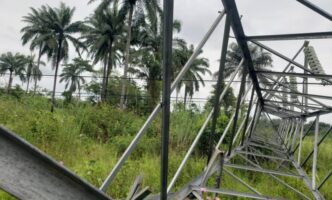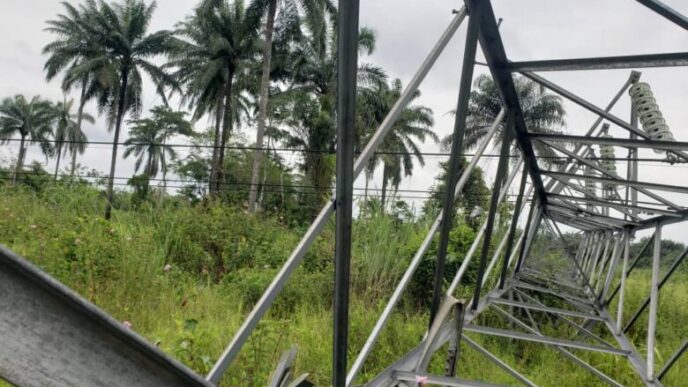BY ISMAIL RABIU
For more than eight days, northern Nigeria has been plunged into darkness due to a prolonged electricity outage, creating a crisis that transcends mere inconvenience and threatens lives, economic stability, and social cohesion. The need to restore electricity in this region cannot be overstated, as the absence of power is gradually pushing the entire area into a state of emergency. The situation requires immediate attention and action from the relevant authorities, as the consequences of continued powerlessness are severe and far-reaching.
Every passing day without power brings untold suffering to millions of people, widening the gaps in development and threatening the region’s stability. It is imperative for the government and relevant authorities to take swift action to restore electricity and implement measures to prevent such outages in the future. Investments in infrastructure, alternative energy sources, and robust maintenance programs are necessary to build a more resilient power supply system.
One of the most pressing issues caused by the lack of electricity is its impact on healthcare facilities. Hospitals and clinics across northern Nigeria rely heavily on electricity to power essential medical equipment such as ventilators, incubators, and dialysis machines. Without consistent power, life-saving treatments cannot be administered, and surgeries are delayed or cancelled. Even storing blood, vaccines, and other perishable medical supplies becomes impossible, putting countless lives at risk. For patients suffering from chronic conditions or those requiring emergency care, these eight days have been a period of dire uncertainty. Restoring electricity is critical to prevent further loss of life and ensure that the health sector can function effectively.
Advertisement
The extended power outage has also crippled the economy of northern Nigeria. Small and medium enterprises (SMEs) that depend on electricity for production and services have been forced to shut down, resulting in significant financial losses. For a region already grappling with high unemployment rates, this situation is a severe blow to economic stability. Businesses involved in food processing, welding, tailoring, and ICT services, among others, are paralysed, and many families are losing their sole source of income. Restoring power is not just about bringing back light; it is about reviving livelihoods, sustaining local economies, and preventing poverty from deepening its roots in this already vulnerable region.
Northern Nigeria is a major agricultural hub, with many farmers relying on electricity for irrigation, processing, and storage. Without electricity, cold storage facilities for crops, dairy products, and other perishable goods have been unable to function, leading to massive spoilage. This has not only resulted in economic losses for farmers but also threatens food security across the region. Additionally, without power for irrigation systems, agricultural productivity is significantly hampered. Restoring electricity would help mitigate these losses, ensuring food security and supporting the agricultural sector, which is the backbone of Northern Nigeria and Nigeria’s economy.
The absence of electricity has also exacerbated security challenges in northern Nigeria. In a region already dealing with conflicts and insurgency, the darkness has provided cover for criminal activities, increasing the frequency of thefts, kidnappings, and other violent crimes. Streetlights and security systems are vital for maintaining public safety, and their absence has left many communities vulnerable. Additionally, the lack of communication due to disrupted networks and reduced access to information has hindered the ability of law enforcement to respond effectively to emergencies. Restoring electricity is, therefore, a matter of national security, as it will help maintain order and protect citizens from harm.
Advertisement
Education is another sector that has been hit hard by the prolonged power outage. Schools and universities depend on electricity for various activities, from running computers and online classes to providing adequate lighting for evening study sessions. The lack of power has interrupted learning, particularly for students who are preparing for critical exams.
Furthermore, the digital divide has widened, as students who rely on the internet for research and learning materials are unable to access these resources. Restoring electricity is essential for ensuring that the youth of Northern Nigeria can continue their education without disruption, as they are the future leaders who will drive the region’s development. It was quite disheartening to realise that many of my students engaged in the final year projects have recorded significant losses in their microbiology laboratory experiments, as many microorganisms die at any temperature far below their required temperature of storage. Many of these students have spent years collecting samples and processing and today everything is gone.
The mental health and well-being of the residents of Northern Nigeria are also being affected by the ongoing power crisis. For many, electricity is more than just a convenience; it is a lifeline. The lack of power disrupts daily routines, causes stress, and leads to a sense of insecurity and despair. The continuous outage has eroded trust in infrastructure and governance, as people feel neglected and abandoned by those responsible for providing essential services. Restoring electricity would not only alleviate these psychological pressures but also restore hope and a sense of normalcy to communities across the region.
The prolonged power outage has forced many businesses and households to resort to alternative power sources such as diesel and petrol generators. While this may provide a temporary solution, it comes at a significant environmental cost. The use of generators has led to increased air and noise pollution, which poses health risks to residents and contributes to environmental degradation. Immediate restoration of electricity would reduce the dependence on generators, promoting cleaner and more sustainable energy consumption.
Advertisement
The current electricity crisis in northern Nigeria demands urgent attention. Northern Nigeria cannot afford to be left in the dark. The restoration of electricity is not just a matter of convenience; it is a matter of life and death, of sustaining livelihoods, and of ensuring the progress and prosperity of an entire region. The time to act is now, and every effort must be made to bring light back to Northern Nigeria.
Ismail Rabiu, a doctoral scholar, writes from Kaohsiung City, China. He can be contacted via: [email protected]
Views expressed by contributors are strictly personal and not of TheCable.











